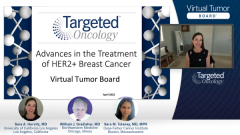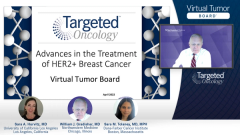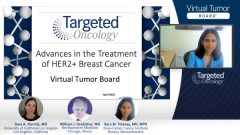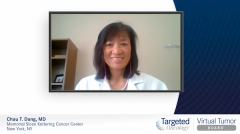
Emerging Treatment Approaches in HER2+ Breast Cancer
Before closing out their discussion on HER2+ breast cancer, expert oncologists share excitement for emerging treatment strategies and ongoing clinical trials.
Episodes in this series

Transcript:
Sara A. Hurvitz, MD: What are the studies on HER2+ breast cancer—during any stage and any location— that you're most excited to see in the next year or so come out? Bill, what do you think is going to be most practice changing, potentially?
William J. Gradishar, MD: The cases we were discussing early on about early-stage disease and the potential for de-escalation in specific subsets of patients who get a PCR [pathologic complete response], and the flip side of that for those patients who don't achieve a PCR, will drugs—like adding tucatinib—make a difference? Or, as Sara [Tolaney] was mentioning, all of these drugs have a tendency to move up when you've validated their activity in metastatic disease. A number of these trials are now looking at use in the residual disease setting and the neoadjuvant setting; we are at the cusp of learning how to optimally use all of these drugs. The challenge is, as these drugs get moved up for those patients who recur, we're going to have to have something available for them, which again, highlights the reason that there's still so much active drug development in this area.
Sara A. Hurvitz, MD: Absolutely. Sara, what about you? What are you most excited to see?
Sara M. Tolaney, MD, MPH: It is exactly what Bill is saying. Can we take these really active drugs and help cure more patients? Can we take T-DXd [trastuzumab deruxtecan], for example, and will DESTINY-Breast05 show that, in residual disease patients, it's helping prevent recurrence? So can we take those high-risk people and do even better than T-DM1 [trastuzumab emtansine] has been doing for people with residual disease? Can we even replace preoperative therapy? I think there are 2 extremes: there's the one that deescalates, like CompassHER2-pCR and Decrescendo to THP [docetaxel, trastuzumab, pertuzumab], and there's the other extreme of taking the really high-risk people and giving T-DXd in the preoperative setting to potentially cure those people. The most exciting thing is being able to cure more patients. I think we've made big strides already with introduction of things like pertuzumab and T-DM1, but now I think there's this opportunity of “right-size therapy;” give people who can get away with less, less therapy, so that they achieve great outcomes with less toxicities, but take people who need more. Now we have all these great drugs and give them more and help cure them. It's a really great time to have all these opportunities for patients.
Sara A. Hurvitz, MD: I would just dovetail on that and say it's phenomenal the percentage of patients we're now seeing with complete responses in a more heavily pretreated setting with the use of T-DXd. My hope is that we're going to begin to follow these patients who have had a CR [complete response] out and see if we can potentially have long-term durable remission, or even cure in the metastatic setting for select patients. That's an area I think we should focus on. We must keep in mind that 1 of the original patients that Dr Dennis Slamon, director, clinical/translational research at UCLA in Los Angeles, treated with trastuzumab in the phase 1 study was cured of her disease, and she had lung metastases. There are some of those patients who can come off therapy, and that's an area we haven't even begun to address or consider, but hopefully, we'll have the luxury of being able to do that as we have more and more active agents.
I'd like to thank my panelists for a very robust and thoughtful discussion today; you made my job so easy. This is such an exciting area, and having the 2 of you experts really talk about the state of the field right now and where we might be going has been a treat. To our viewing audience, thank you for joining us for this Targeted Oncology™ Virtual Tumor Board® presentation. We hope today's discussion was a valuable use of your time, and that you acquired practical knowledge that can help you in your clinical practice. Thank you so much.
Transcript edited for clarity.












































